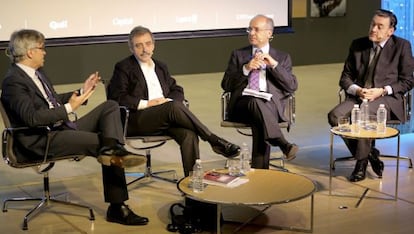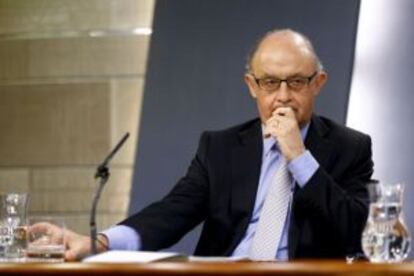Spain’s top museum chiefs decry crippling taxes and call for dialogue
Heads of Prado, Reina Sofía and Thyssen-Bornemisza speak at a rare joint public event

They are the heads of the three most important museums in Spain, but they are rarely seen together, much less to publicly talk about thorny subjects such as taxes and politics.
But in a panel discussion held earlier this week in Madrid, Miguel Zugaza, of the Prado Museum, Manuel Borja-Villel, of the Reina Sofía, and Guillermo Solana, of the Thyssen-Bornemisza, set out their vision on these and other topics.
And whereas there was some ground for disagreement, all three clearly rejected the value-added tax hike that currently sees cultural goods and services with a 21% rate.
It is a mistake to raise VAT on culture, a sector that does not seek benefits, and the effects for the Treasury are doubtful”
Miguel Zugaza, director of the Prado Museum
Speaking at the Telefónica Foundation, where all three were participating in the presentation of a new magazine, Capital Arte, Zugaza and Borja-Villel underscored the opportunity for dialogue in the aftermath of Sunday’s municipal and regional elections, which have created a highly fragmented political scenario across Spain.
“If the results express anything at all, it is the will to talk, to engage in dialogue, which is a principle that guides the art world and is a very positive element,” said the director of the Reina Sofía.
“We have seen the greatest political fragmentation. And I don’t think that is a bad beginning, but a positive thing for new people to join politics and want to participate in elections. Generating pacts and dialogue is very positive for the future,” added the Prado chief.

Asked whether they agree with the popular claim that the Spanish left is more sensitive to culture than the right, Solana described this view as “short-sighted.”
“It’s true that in the 20th century art did have a revolutionary component and was associated with the political left,” said the head of the Thyssen-Bornemisza center. “But traditionally, art has been linked to the rhetoric of power. Europe’s great museums play out this ideology of power, not the ideology of resistance. In Spain, the great art that now conforms our museums was collected by the monarchs; it was not a left-wing or a revolutionary art, even though that kind of thing slipped through the cracks of the king’s court. Art belonged to whoever paid for it.”
For a law like that to work, you need a society that is willing to give back what it obtains from it, which is the case in Anglo societies, but I’m not sure about here”
Manuel Borja-Villel, director of the Reina Sofía Museum
Zugaza added that “the left has traditionally attempted to hold a monopoly on culture and circulate the claim that culture is part of its own world. This is not real. Culture is neither right-wing nor left-wing. What matters is what the various governments have done. A Socialist friend of mine told me that the people who have done the most for the Prado are actually – and this is his personal opinion – the most nefarious historical figures, [early 19th century] King Fernando VII and [former conservative prime minister] José María Aznar. And I could not deny it. Under Aznar, there was an expansion of the Prado, the Thyssen, the Reina… That modernizing period was very important for the history of the Prado.”
When the conversation turned to the arts patronage law, a project that has been in the pipeline for years, the crowd of gallery owners and other art world professionals pricked their ears up. Originally planned to encourage private sponsorships in combination with public support for the arts, the draft law has lately been reduced to a series of tax breaks that few people seem to be happy with.
“For a law like that to work, you need a society that is willing to give back what it obtains from it, which is the case in Anglo societies, but I’m not sure about here,” said Borja-Villel. “The basic, really important thing [about arts patronage] is education, processes, the things that have no market value, research, experimentation. Is the Anglo model favoring this type of project? The answer may possibly be no. What’s being done in New York? In general, mainstream stuff. The point is, does that law emphasize things that do not bring media attention or immediate results, like education?”
Zugaza added his thoughts about the matter. “We need to create patronage habits. This government has shown a tremendous willingness, but it has come up against reality, against a very adverse economic situation, and [the legislation] could not be developed. But the reality is that culture lives off the public budget, and will continue to do so. Creating a screen by handing over responsibility to the private sector is not good and it is not going to happen. In Spain and in Europe, culture is a public service and this public nature must be defended. If society contributes resources that’s fantastic, but one thing cannot replace the other.”
As for the 21% VAT rate, there was general consensus among everyone in the room. The head of the Thyssen-Bornemisza talked about the “brutal price hike” of exhibitions. “I understand the dire situation, but the Treasury has been notoriously insensitive and probably not proportionate to the profits it expected to make.”
“And then you have the added problem of VAT on art purchases, which is a considerable handicap,” added Borja-Villel.
Zugaza agreed. “It is a mistake to raise VAT on culture, a sector that does not seek benefits, while the effects for the Treasury are doubtful.”
Tu suscripción se está usando en otro dispositivo
¿Quieres añadir otro usuario a tu suscripción?
Si continúas leyendo en este dispositivo, no se podrá leer en el otro.
FlechaTu suscripción se está usando en otro dispositivo y solo puedes acceder a EL PAÍS desde un dispositivo a la vez.
Si quieres compartir tu cuenta, cambia tu suscripción a la modalidad Premium, así podrás añadir otro usuario. Cada uno accederá con su propia cuenta de email, lo que os permitirá personalizar vuestra experiencia en EL PAÍS.
¿Tienes una suscripción de empresa? Accede aquí para contratar más cuentas.
En el caso de no saber quién está usando tu cuenta, te recomendamos cambiar tu contraseña aquí.
Si decides continuar compartiendo tu cuenta, este mensaje se mostrará en tu dispositivo y en el de la otra persona que está usando tu cuenta de forma indefinida, afectando a tu experiencia de lectura. Puedes consultar aquí los términos y condiciones de la suscripción digital.









































